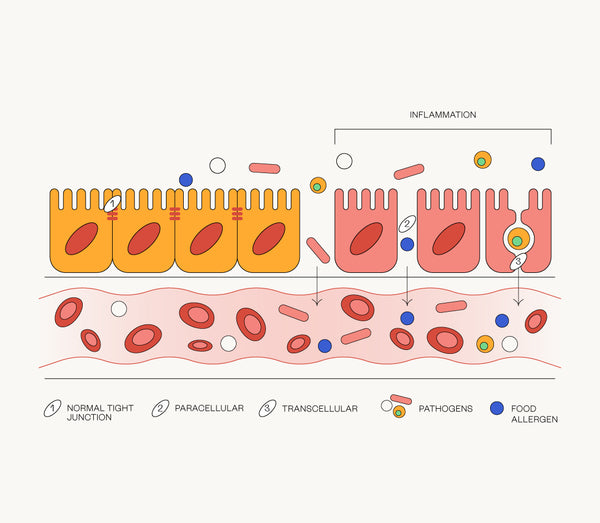Live Cultures 101
Your food is alive! (Well, sort of!)We’re talking about live cultures and probiotics, of course. So, sit tight, with your glass of trendy Kefir and come with us on a journey to find out what constitutes a probiotic.
Trust us, you’re sure to be amazed.
What are Probiotics?
Probiotics, according to The World Health Organisation (WHO) are:“live microorganisms which, when administered in adequate amounts, confer a health benefit on the host.” [1]
Forget the jargon, basically they’re microbes like bacteria, yeast, and viruses that benefit your health when you ingest enough of them.
Probiotics are new, aren’t they?
You might think that probiotics are a new kid on the block. But they’re not. These microbial wonders of the world are at least as old as human history, thanks to their connection to fermented food [2].
Fermentation is where microbes transform food and drink, without oxygen, into something desirable – maybe for better flavour, preservation, or to make them more tolerable for the digestive system.
Fermentation was probably discovered by accident. In the Middle East, milk was transported in bags made from animal stomachs (bacteria havens). The hot climate meant bacteria could thrive, turning the milk into yoghurt. This staple foodstuff has been hailed for its health benefits ever since. The Turks even considered it to be the elixir of life [3]!
Fermentation has been utilised to produce staple foods like dairy products and pickled vegetables. And of course, it’s biggest export, alcohol, too. Thank you, you beautiful bacteria!
Prebiotics, Probiotics, Synbiotics – The Culture Club
They sound similar but prebiotics and probiotics are doing a different job to keep you happy!
Probiotics, live cultures, or active bacteria are the live bacteria or microorganisms that are present in foods and beverages, that if you consume enough of, will benefit your health.
Prebiotics are the food the good or probiotic bacteria need to survive and thrive, like dietary fibre.
Synbiotics are the combination of probiotics and prebiotics. These supplements contain the probiotic strain’s favourite food to ensure maximum benefit [4].
You can think of probiotics and prebiotics like Pac-Man.
Pac-Man = probiotic bacteria.
Food = prebiotics.
Points = the health benefits generated by the probiotics.
Want to know more about prebiotics? Head to our Food, Prebiotics, and the Microbiome page [link].

So, How Do Probiotics Work?
Probiotics help to restore and maintain the balance of your gut. There is a misunderstanding that probiotics must colonise your gut to make a difference. That’s not strictly true. Instead, they are transient, so they travel through your digestive tract interacting with your gut cells, immune cells, nutrients, and existing bacteria to deliver benefits both directly and indirectly. Although different strains work in different ways, collectively probiotics strive to make the gut environment healthy and support both the gastrointestinal tract and the immune system [5].

Micro-Mechanisms, Macro-Benefits
Probiotic bacteria are super cool! At a micro-level, bacteria interact with the lining of your gut to produce some astonishing results. Their ability to restore the natural balance of your gut bacteria means better digestion, less bloating, good moods, enhanced immunity, and regular, softer poops!
The Good Guys. Studies show that many strains of Lactobacillus and Bifidobacterium can compete with pathogenic bacteria to stop them sticking to your intestinal wall and making you ill [6]. Probiotics are the good guys who fight off the baddies to help keep you and your gut healthy.
The Defensive Wall. Probiotics can enhance the loose epithelial barrier in the colon and strengthen its tight junctions. Think of these like the wall in a football free kick – they stand tight together to prevent unwanted things (football) getting into the bloodstream (goal). Research suggests that probiotics may help lower the chances of developing inflammation related diseases like inflammatory bowel disease, irritable bowel syndrome (IBS), obesity, diabetes, even Alzheimer’s, Parkinson’s, and cancer [7, 8].
Immune system + probiotics = BFFs. Studies show there are several beneficial effects of probiotics for the immune system, including competing with pathogens and producing pathogenic bacterial killer substances to get rid of them [9]. They also regulate your immune responses by promoting the production of immune cells like T lymphocytes, IgA-producers, and natural killer cells – all part of the valuable arsenal in your immune system [10].
Infection Inspectors. Friendly bacteria strains work hard to keep you in a top bill of health by preventing infections. That’s why they’re often prescribed alongside antibiotics. Why? Because antibiotics are apocalyptic to bacteria, eliminating both good and bad, without discrimination [11]. Clinical trials show that probiotic strains like certain Lactobacilli e.g., Lactobacillus acidophilus and Saccharomyces boulardii are effective at preventing antibiotic induced diarrhoea [12].
Butyrate Boosters. Butyrate is important for you because 1. It is the primary source of fuel for the cells lining your colon. 2. It keeps the gut in an oxygen-free state (bacteria love that) and 3. It helps keep the microbiome balanced. The addition of specific probiotic species in the gut, modulates the composition of the gut microbiota, increasing the production of SCFAs, especially butyrate [14]. Higher butyrate = better health. You buty’s!
Probiotics are for life, not just for illness
Where can I find probiotics?
Probiotics are live microorganisms and can be found in:
Dairy foods – yoghurt, cheese, kefir
Water kefir
Kimchi
Kombucha
Sauerkraut
Sourdough bread
Tempeh
Lacto-fermented pickled vegetables
Probiotic supplements
So, I can just eat Kimchi, right?
Not quite.
Although, fermented foods contain living microorganisms, they don’t always fit the definition of a probiotic. Do you know the quantity you’re consuming? Is there scientific evidence proving, in the right quantities, that strain will give you at least one health benefit? Importantly, will it survive acidic human digestive tracts?
You may not know the answers to all those questions, but the key thing is to eat a healthy, balanced diet to ensure you get all the nutrients your body requires. In doing so, you’ll also be helping to feed your gut microbes. In other words, don’t just rely on fermented foods to boost your gut 😊!
CFU. What the FU…does it mean?
Simply, CFU stands for colony forming unit and is a science-y term used to describe the number of viable cells in a sample. When talking about probiotics, it refers to how many cells in a supplement or foodstuff. In our case, it means there are 15 billion individual live cultures in each capsule.
It’s quality over quantity, always
Bigger is not always better. Instead, it’s quality over quantity that’s key here.
That’s why we’ve developed a probiotic which includes 15 billion individual live cultures (that’s 15 times higher than the minimum requirement) that are strong, active, and actually thriving.
Probiotics side effects – don’t they cause diarrhoea though?
Probiotics can cause some gastrointestinal related side effects like gas, bloating, diarrhoea, and some mild tummy discomfort. However, as your body adjusts these should quickly subside.
If you have existing health conditions, you should consult your healthcare provider before taking any probiotic supplement.
My gut’s fine, why do I need a probiotic?
Probiotics are more than just your gut. Your gastrointestinal system and the gut microbiome are like a second brain, interconnected to all bodily systems and influencing everything from your immune system to your skin health.
While the immediate and local effects of probiotics are well-publicised, they also have many powerful effects across the whole of the human body.
For example, a randomised placebo-controlled trial carried out in 2011 showed that a specific probiotic could prevent recurring urinary tract infections [13].
Plus, probiotic species are also good for your mouth microbiome, too. Studies show that specific types of probiotics like Bifidobacteria lactis and Lactobacillus rhamnosus can reduce plaque and inflammation in your mouth [15].
And that’s not all, a balanced gut can help boost your mood, increase your energy, and just generally make you feel fab!
Health is no longer primarily focused on cure, it’s about prevention and being proactive. Alongside factors like diet, exercise, and lifestyle, being proactively engaged in your health will enable you to enjoy the life you love for longer.
Sources
Gilbert, J., Blaser, M, J., Caporaso, J, G., Jannsson, J., Lynch, S, V and Knight, R. Current understanding of the human microbiome. Nat Med 24. https://doi.org/10.1038/nm.4517 (2018)
[1] Mack, D, R. Probiotics. Can Fam Physician 51. (2005)
[2] Gasbarrini, G et al. Probiotics History. Journal of Clinical Gastroenterology 50. doi: 10.1097/MCG.0000000000000697
[3] Ozen, M and Dinleyici, E, C. The History of Probiotics: The Untold Story. Benef Microbes 6. doi: 10.3920/BM2014.0103.
[4] Pandy, K, R., Naik, S, R and Vakil, B, V. Probiotics, Prebiotics and Synbiotics – A Review. J Food Sci Technol 52. 10.1007/s13197-015-1921-1
[5] Redi, G. Probiotics, Definition, Scope and Mechanisms of Action. Best Practice and Research Clinical Gastroenterology 30. https://doi.org/10.1016/j.bpg.2015.12.001
[6] Rao, R, K and Samak, G. Protection and Restitution of Gut Barrier by Probiotics: Nutritional and Clinical Implications. Curr Nutr Food Sci 9. https://doi.org/10.2174/1573401311309020004
[7] Bron, P, A et al. Can Probiotics Modulate Human Disease by Impacting Intestinal Barrier Function? Br J Nutr 117. doi: 10.1017/S0007114516004037
[8] Tan, A, H et al. Probiotics for Parkinson’s Disease: Current Evidence and Future Directions. JGH Open 5. https://doi.org/10.1002/jgh3.12450
[9] Yan, F and Polk, D, B. Probiotics, and Immune Health. Curr Opin Gastroenterol 27. doi: 10.1097/MOG.0b013e32834baa4d (2011)
[10] Ouwehand, A, C et al. Probiotics: An Overview of Beneficial Effects. Antonie Van Leeuwenhoek. (2002)
[11] Dethlefsen, L et al. The Pervasive Effects of an Antibiotic on the Human Gut Microbiota, As Revealed by Deep 16S rRNA Sequencing. PLoS Biol. 6. doi: 10.1371/journal.pbio.0060280. (2008)
[12] D’Souza, A, L et al. Probiotics in Prevention of Antibiotic Associated Diarrhoea: Meta-Analysis. BMJ 324. doi: 10.1136/bmj.324.7350.1361 (2002).
[13] Stapleton, A, E et al. Randomized, Placebo-Controlled Phase 2 Trial of a Lactobacillus Crispatus Probiotic Given Intravaginally for Prevention of Recurrent Urinary Tract Infection. Clin Infect Dis. 52. doi: 10.1093/cid/cir183. (2011)
[14] Moens, F et al. A Four-Strain Probiotic Exerts Positive Immunomodulatory Effects by Enhancing Colonic Butyrate Production In Vitro. International Journal of Pharmaceutics 555. https://doi.org/10.1016/j.ijpharm.2018.11.020 (2019)
[15] Toivianen, A et al. Impact of Orally Administered Lozenges with Lactobacillus rhamnosus GG and Bifidobacterium animalis subsp. Lactis BB-12 On The Number of Salivary Muntans Streptococci, Amount of Plaque, Gingival Inflammation and The Oral Microbiome in Healthy Adults. Clin Oral Investig 19. doi: 10.1007/s00784-014-1221-6


